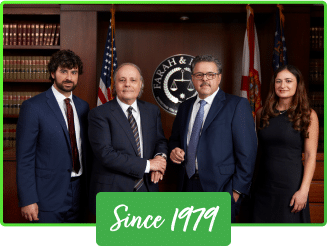Tampa Social Security Disability Lawyers
Social Security Disability benefits can help to offset the financial burdens related to a permanent impairment or disability. Strict eligibility requirements include a substantive work history and a documented disability. Our disability attorneys in Tampa can help you prepare your initial application or appeal a denial.
FREE CASE REVIEW
Home > Tampa Personal Injury Lawyers > Tampa Social Security Disability Lawyers
Have you recently suffered a permanent disability that prevents you from working? You may be entitled to government disability benefits to help offset your loss of income. The top-rated Florida Social Security Disability lawyers at Farah & Farah have the experience and resources necessary to make a strong claim and recover the benefits you deserve.
For more than four decades, Farah & Farah has been a leading advocate for injured and disabled workers in Tampa. Our injury law firm uses a client-centric approach to leverage the experience, background, and skills of our entire team to help you get the disability benefits you need.
Fighting for Social Security Disability Insurance, or SSDI, benefits can be intimidating. Let our award-winning Florida attorneys help you navigate the process and fight for the full benefits you deserve. Call our law office in Tampa, FL, at (813) 358-0490 for a free consultation.
Why Should I Choose Farah & Farah to Handle My Claim for SSDI Benefits?
While you may be legally entitled to SSDI benefits, the claims process can be daunting. Nearly two-thirds of all SSDI claims are initially denied, leaving claimants feeling stressed out and uncertain about their futures.
You can set yourself up for success by hiring an experienced Tampa personal injury attorney to take charge of your claim for benefits.
Don’t underestimate the importance of the attorney and law firm you hire to represent you. Here’s why you shouldn’t hesitate to contact Farah & Farah for help with your SSDI case:
- We’ve fought for injured workers in Tampa and throughout Florida since our founding in 1979.
- With over four decades of experience, our SSDI attorneys are among Tampa’s most highly rated.
- We embrace our home-grown roots through community service and participation in local events.
- Our case results speak volumes.
- There is no cost to hire our SSDI attorneys in Tampa unless we recover benefits on your behalf.
- Client reviews and testimonials attest to our commitment to treating the people we represent with honesty, dignity, and respect.
If you’re disabled, Social Security Disability benefits are crucial to your well-being and ability to care for you and your family. At Farah & Farah, we will fight to ensure you get the total benefits available.
Contact our law office in Tampa, Florida, to learn more about your rights and discover how our acclaimed legal team can help you maximize your recovery.
How Farah & Farah Can Help with Your SSDI Claim
Hiring an attorney takes the pressure and burden of a legal claim off your shoulders. It also gives you time to focus on forging a path onward and moving forward with your life.
At Farah & Farah, we’re ready to handle every aspect of your legal claim for you. Count on us to do the following:
- Analyze all the eligibility factors, such as your type of injury or disability and whether you’ve worked in jobs covered by Social Security.
- Gather medical records and other relevant evidence to strengthen your claim for benefits.
- Prepare and submit your claim.
- Satisfy all procedural requirements and filing deadlines.
- Represent you during all hearings.
- Advocate for your best interests during all hearings and throughout the appeals process if and when your claim is denied.
Our SSDI attorneys in Tampa work on a contingency fee basis. Simply put, there’s no cost to hire our law firm unless we help you secure Social Security Disability benefits. We also offer a free initial consultation to learn more about your options and how we can help you with your disability claim.
Social Security Disability Benefits for Injured Workers in Florida
Social Security Disability Insurance is a federally-funded insurance system that provides financial benefits to people who cannot work and earn an income because of a permanent disability or debilitating medical condition.
You must have paid federal taxes into the Social Security system to qualify for SSDI benefits.
What Is Considered a Disability Under the Social Security Disability Act?
The Social Security Administration (SSA) strictly defines what qualifies as a disability and is compensable through the SSDI system. Generally speaking, your condition must be severe and “significantly limit your ability to do basic work-related activities” for at least 12 months or is expected to result in death. The SSA has a list of conditions that typically qualify as disabling, which fall into the following categories:
- Musculoskeletal disorders
- Special senses and speech disorders
- Respiratory disorders
- Cardiovascular system disorders
- Digestive system disorders
- Genitourinary disorders
- Hematological disorders
- Skin disorders
- Endocrine disorders
- Congenital disorders that affect multiple body systems
- Neurological disorders
- Mental disorders
- Cancer
- Immune system disorders
Ultimately, any condition that fundamentally interferes with your ability to do your job for an extended period can qualify for disability benefits. Working with an experienced SSDI attorney in Tampa can help you build a strong case to obtain the benefits you need to live your life.
Our firm wins more than the national average in recovering social security benefits for clients that were initially denied.

How Do I Qualify for SSDI Benefits in Florida?
The Social Security Administration will consider four primary elements when deciding if you qualify for SSDI benefits.
- Are you currently working? If your monthly income exceeds $1,470, you will probably not qualify for SSDI benefits.
- Is your medical condition severe? Your condition must have prevented you from performing basic work-related activities for at least 12 months.
- Does the SSA list your condition as disabling? If so, it can provide an easier path to qualifying for benefits. Some conditions—like ALS and acute leukemia—automatically qualify. If your condition isn’t listed, the SSA will carefully scrutinize your medical records to determine if it qualifies.
- Can you perform other work? Even if you have a qualifying condition, the SSA will want to know if you can do the work you’ve done in the past or perform any other type of work, using an outdated vocational list. If you can work, the SSA will typically deny a claim for benefits.
Can Farah & Farah Help Me Obtain SSDI Benefits?
When you prepare a claim for SSDI benefits, it’s important to establish that you suffer from a serious medical condition and that it substantially interferes with your ability to work. Our Tampa disability lawyers will compile necessary medical records, work records, and expert testimony to build a compelling claim that will persuade the SSA that you qualify for disability benefits.
Contact our attorneys for help with your SSDI claim if the following applies to you:
- You’re within 49-63 years of age
- You’re not currently receiving SSDI benefits or early retirement
- You’re not working at all (part time or full time)
- You worked 5 out of the last 10 years before becoming disabled
- You have seen a doctor within the last 1-2 years for your conditions
- You are not represented by an attorney for this potential case
How Long Are SSDI Benefits Paid?
Once you qualify for SSDI benefits, you can receive them until you are no longer disabled or turn 65, whichever is sooner.
What Are Disabled Adult Child Benefits?
Disabled Adult Child, or DAC, benefits are a type of SSD award paid to your unmarried adult child who suffers a qualifying disability before age 22.
DAC benefits are based on the parent’s Social Security earnings record, so there is no requirement that the recipient must have held a job and paid into the Social Security system to receive benefits. However, DAC benefits can be denied if the claimant has significant earnings, typically exceeding $1,470 weekly.
Benefits are payable when the claimant’s parent begins to collect Social Security retirement benefits or dies. In most situations, DAC benefits are payable until a claimant gets married, with limited exceptions.
What Are Widow or Widower Benefits?
When a worker dies, their surviving spouse may qualify for SSDI benefits. These benefits, known as widow or widower benefits, or DWB, can be paid if the surviving spouse or surviving divorced spouse meets the following criteria:
- Is at least 50 but not older than 60 years of age.
- Suffers from a disability that qualifies for SSDI benefits within seven years of the worker’s death.
Like DAC benefits, DWB benefits are based on the deceased worker’s Social Security earnings.
What Are SSDI Work Credits?
To qualify for Social Security Disability Insurance benefits, you must have worked and contributed to the Social Security system through payroll withholdings. Your work must have been recent and substantial enough to warrant payment of SSDI benefits.
You earn work credits based on the amount of time you work and the wages you earn each year. A maximum of four work credits can be earned annually.
In 2023, one work credit is earned for every $1,640 in wages or self-employment income—the value of a work credit changes over time.
How Many Work Credits Do I Need to Qualify for SSDI Benefits?
While it can depend on the age at which you suffer a disability, you’ll generally need 40 work credits to qualify for SSDI benefits, with 20 of those work credits earned within the past 10 years.
If you suffer a disability at a young age, the work credit requirement can be reduced or voided.
What Can I Do if My Claim for SSDI Benefits Is Denied?
You have the legal right to appeal a denied claim for SSDI benefits. You can file appeals at the following stages.
Reconsideration: Your initial appeal is a request for reconsideration, which must be filed within 60 days of receiving your denial notice.
Hearing Before an ALJ: If your claim is still denied after reconsideration, you can file an appeal and request a hearing with an Administrative Law Judge (ALJ).
During this hearing, the judge will explain why your application was denied. Often, this results from inadequate information and evidence to prove a disability exists or persists. The judge may request additional information to supplement your claims, such as medical records and work documents.
During the hearing, you can present evidence of your medical condition and inability to perform basic work tasks. After the hearing, the judge will decide based on your initial claim, additional information provided, and witness and expert testimony offered during the procedure. If it’s approved, you will begin to receive benefits.
Appeals Council: If the administrative law judge denies your claim, you can ask the Appeals Council to review your request. You can submit new information to support your claim at this time. If the Appeals Council grants your request for review, it can send the case back to an administrative law judge or decide the case itself.
Federal Claim: If the Appeals Council upholds the denial of your claim for SSDI benefits, you have one final opportunity to appeal the decision. You can file a claim with the U.S. District Court for the Middle District of Florida in Tampa. A District Court judge will review your claim and all supporting evidence and issue a final decision.
The SSDI appeals process can be complicated, so it’s important to enlist the help of an experienced SSDI attorney in Tampa. When you hire Farah & Farah, you put a team of respected and successful Florida litigators on your case and give yourself the peace of mind you need during this stressful time.
Call Our Trusted Tampa SSDI Lawyers for Help Today
Set yourself up for a successful outcome by calling the Tampa SSDI attorneys at Farah & Farah. Experience matters in these types of cases, and we’re happy to put ours to work for you.
Call our law office in Tampa, Florida, at (813) 358-0490 to get started. Your initial case evaluation is free.
wrongful death motorcycle accident recovery
motorcycle injury settlement
fatal motorcycle accident recovery
motorcycle crash settlement
motorcycle accident settlement
5100 W Kennedy Blvd
Unit 250
Tampa, FL 33609














FREE CASE REVIEW

